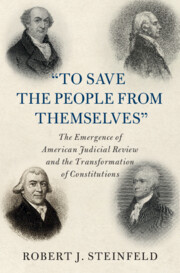 'To Save the People from Themselves'
'To Save the People from Themselves' Book contents
- “To Save the People from Themselves”
- Cambridge Historical Studies in American Law and Society
- “To Save the People from Themselves”
- Copyright page
- Dedication
- Contents
- Acknowledgments
- Introduction
- Part One Legislatures and Legislation under the First American Constitutions
- 1 The Largely “Legislative” Character of the (“Horizontal” and “Vertical”) Constitutional Checks Placed on Colonial Legislatures
- 2 The Traditional Nature of the First Written Constitutions and the Role of Legislatures as Their Primary Expounders
- 3 Restoring “Legislative” Review of the Laws: The New York Constitution of 1777
- Part Two The Emergence of American Judicial Review: 1779–1787
- Part Three Judicial Review at the Federal Convention
- Index
1 - The Largely “Legislative” Character of the (“Horizontal” and “Vertical”) Constitutional Checks Placed on Colonial Legislatures
from Part One - Legislatures and Legislation under the First American Constitutions
Published online by Cambridge University Press: 17 September 2021
- “To Save the People from Themselves”
- Cambridge Historical Studies in American Law and Society
- “To Save the People from Themselves”
- Copyright page
- Dedication
- Contents
- Acknowledgments
- Introduction
- Part One Legislatures and Legislation under the First American Constitutions
- 1 The Largely “Legislative” Character of the (“Horizontal” and “Vertical”) Constitutional Checks Placed on Colonial Legislatures
- 2 The Traditional Nature of the First Written Constitutions and the Role of Legislatures as Their Primary Expounders
- 3 Restoring “Legislative” Review of the Laws: The New York Constitution of 1777
- Part Two The Emergence of American Judicial Review: 1779–1787
- Part Three Judicial Review at the Federal Convention
- Index
Summary
American colonial governments, which were established over the course of the seventeenth and early eighteenth centuries, took, as is well known, one of three basic forms. They were organized either as royal, proprietary, or corporate colonies. By the middle of the eighteenth century, the majority of colonies (eight of the thirteen) had been taken under the direct rule of the British Monarch. Three colonies remained proprietorships, Maryland, Pennsylvania, and Delaware, which “ntil the Revolution … had [a separate legislature but] the same governor as Pennsylvania.”1 Only two, Connecticut and Rhode Island, retained their status as corporate colonies.
- Type
- Chapter
- Information
- 'To Save the People from Themselves'The Emergence of American Judicial Review and the Transformation of Constitutions, pp. 33 - 71Publisher: Cambridge University PressPrint publication year: 2021
